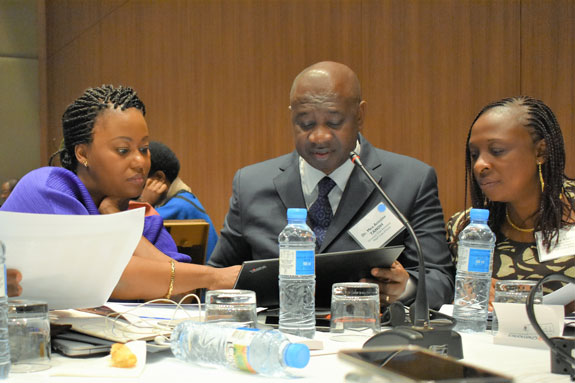
25 Apr HRH2030 Convenes Global Leaders in Malaria Control in Guinea
In March, HRH2030 hosted its first Semiannual Capacity Building for Malaria (CBM) Meeting in Conakry, Guinea, convening senior government officials and technical advisors from 11 countries* to exchange lessons learned, successes, and challenges among National Malaria Control Programs (NMCPs). The meeting, which was the first international malaria meeting to be held in Guinea, encouraged networking and regional sharing of innovations and proven strategies in malaria control.
After gathering suggestions and input during the preparatory phase from the advisors, partner organizations, and USAID, the CBM team chose two main themes to highlight during the meeting:
- Improving monitoring and evaluation (M&E) systems
- Strengthening supply chain systems
Together, the 42 participants gained a new or greater understanding of HRH2030, the CBM activity, and USAID/PMI’s historical support for technical advisors. They also outlined priority activities to improve NMCP and country M&E and supply chain systems for malaria control/elimination. The HRH2030 team used the meeting as an opportune venue to introduce a virtual community of practice platform to encourage knowledge sharing, exchange program resources, and provide networking/exchange capabilities. This platform will be beta tested with advisors and then opened to NMCP members and partners as well, including from countries that do not currently have technical advisors supported by USAID/PMI.
“ It was a great pleasure… to have a week full of exchanges and sharing of information, experiences, and ideas. The meeting was a success, and we will all be working to give the project the best of ourselves.”
— Dr. Pepin Miyigbena, HRH2030 Technical Advisor, Côte d’Ivoire
The first day of the meeting covered the evolution of USAID/PMI support to long-term technical assistance programs across projects (e.g., HRH2030; Maternal Child Survival Program; Systems for Improved Access to Pharmaceuticals and Services; Leadership, Management and Governance Project), a review of the Capability Maturity Model framework used to evaluate areas for strengthening within NMCP organizations, and featured success stories related to M&E and supply chain activities in presentations, and panel discussions made by participants. The next few days consisted of working group sessions focused on practical, priority actions advisors and NMCP counterparts can put in place to encourage incremental strengthening of in-country M&E and supply chain systems.
Discussions throughout the conference highlighted the importance of collaboration and leveraging experience of global partners, partner projects, and individual technical advisors to strengthen countries’ malaria response and optimize use of Global Fund grant funding.
“The work we — USAID, PMI, and the NMCPs — do is alive and well,” noted USAID Senior Program Advisor and PMI/Global Fund Liaison Dr. Erik Janowsky. “Our goal here is to strengthen the correlation between the work of our technical advisors and Global Fund grant grades.”
HRH2030 will continue to support this global community of leaders in malaria control through quarterly conferences, in person and virtually, and through the newly established virtual community of practice platform.
* Countries represented included Burundi, Cameroon, Chad, Cote d’Ivoire, Guinea, India, Nepal, Niger, Sierra Leone, The Gambia, and Togo.





